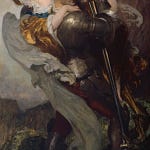Advent is here, and so are our Christmas offers at Word & Song!
Now through Epiphany new paid, gift, and upgraded subscriptions are 25% off.
Paid subscribers see a special gift offer at the very bottom of this page.
There’s a photograph in the main hallway of the building that was once the entirety of Providence College, where I taught for 27 years. It features a burly and shaggy man, with spectacles, one of the shrewdest and wisest men of the century, G. K. Chesterton. Yes, the great man himself had come to visit America, and on that visit he gave a talk from a tiny balcony protruding from the second story of Harkins Hall, to the assembled men below. That was in 1930, and so the college was very unlike it is today.
I can’t resist quoting the account of it given here in the college’s literary magazine of those days, The Alembic:
Accompanied by the Right Reverend William A . Hickey, D.D., the great literary dictator, Gilbert Keith Chesterton, addressed the student body on the morning of December 11th, 1930, and attended a luncheon given by the faculty in his honor. He was introduced by Dr. McCarthy, and in his own inimitable way, this renowned lecturer, poet, essayist, and critic won his way into our hearts with his smile and a harmonious flow of simple, yet intriguing, diction that suggested rather than conveyed the sparkling epigram, the humorous quirk, the startling paradox that lurk in the mind of a man whose thoughts come in battalions. He wasn’t aware, he told us, that he really had any message to offer us, but he was sure that he wouldn’t try our patience as he had that of the boys at Notre Dame, who had marvelous powers of endurance and a wonderful capacity for pain as attested by their suffering him to afflict them with no less than thirty-six-lectures. (Parenthetically, he confided to us that his best Parisian accent couldn’t master the American mode of designating the Alma Mater of the Irish from South Bend.) He was pleased to visit Providence College because of the auspices of the Dominicans. Many preaching friars in England were dear friends of his, he averred, particularly Father Vincent McNabb, who is one of the truly great minds of the present time, and, therefore, not mentioned by the newspapers. But the papers for that matter are fifty years behind the times and some day, realizing the fact, will awaken to the force and vitality of such Catholic colleges as Providence. But at present, he continued, the daily prefers to blazon the names of men whose power is not only insignificant, but even invisible. In concluding, he ventured the hope that many of the boys in his audience would some day be stalwart defenders of the truth, unyielding champions of the Faith. Bishop Hickey, in a voice that revealed his deep appreciation, cordially thanked Mr. Chesterton for his words of inspiration.
You can probably gather from that humorous account that Chesterton was a bluff fellow, and it is true, his thoughts do come forth in battalions. He was a born fighter, yet he had not an ounce of malice in him, and he loved to make fast friends across political and religious differences, as he did with that notorious unbeliever, George Bernard Shaw. Most especially, Chesterton is a poet of the adventure of human life, by which I certainly do not mean that he recommended going forth to take photographs of the Grand Canyon. For him, the blue sky above was an ocean of living sapphire; a blade of grass was a quiet mystery; the human face, a work of strange and staggering beauty. He loved the old folk tales and fairy tales not because they were pleasant (they are sometimes not pleasant) but because they were true. Please don’t think that this was sentimentality. It was good solid wonder, and good solid theology, too, which for him were one and the same thing. And that brings us to the adventure he urges upon us in our Poem of the Week, “The Kingdom of God.”
In the poem, God speaks in succession to the forces of nature, the men of the wilds, and the civilized men of Chesterton’s time, those who had harnessed the power of steam and of engines. To each of them He gives the same command, though in terms proper to their being and their state: Build the kingdom of God. And each of them fails, but the failure is due not just to the magnificence and the mystery of what they are charged with building, but also to their faintness of heart, the ease with which they give up. And let us say that Chesterton himself was a man who never gave up.
In each of the failures, too, we see that there is no real peace. The forces of nature fail, but the wild winds still blow. Savage man fails, but “the wild men clamor still.” Civilized man fails, but “the wise men doubt today.” Yet we go on. I do not believe that he is saying that man can build up the Kingdom of God by his own force, if he is only determined enough. That gets the matter backwards. Man must fail at this task. The two dangers, as I see it, are that he ceases to build at all, having given up the hard work of the spirit, even as he may continue to pave his world with highways, and mar the skies with towers of steel and glass; or that he replaces the Kingdom of God with the Something-or-Other of Man, such things as have plagued the world for the last two hundred years or so.
Yet the work goes on, and that is because God in His grace will not leave us to our own ways and means. The passion to enter the Kingdom of God is intrinsic to us; and in His providence — Providence! — what we do now may bear fruit we cannot imagine.
Said the Lord God, "Build a house, Build it in the gorge of death, Found it in the throats of hell. Where the lost sea muttereth, Fires and whirlwinds, build it well." Labored sternly flame and wind, But a little, and they cry, "Lord, we doubt of this Thy will, We are blind and murmur why," And the winds are murmuring still. Said the Lord God, "Build a house, Cleave its treasure from the earth, With the jarring powers of hell Strive with formless might and mirth, Tribes and war-men, build it well." Then the raw red sons of men Brake the soil, and lopped the wood, But a little and they shrill, "Lord, we cannot view Thy good," And the wild men clamor still. Said the Lord God, "Build a house, Smoke and iron, spark and steam, Speak and vote and buy and sell; Let a new world throb and stream, Seers and makers, build it well." Strove the cunning men and strong, But a little and they cry, "Lord, mayhap we are but clay, And we cannot know the why," And the wise men doubt today. Yet though worn and deaf and blind, Force and savage, king and seer Labor still, they know not why; At the dim foundation here, Knead and plough and think and ply. Till at last, mayhap, hereon, Fused of passion and accord, Love its crown and peace its stay Rise the city of the Lord That we darkly build today.
Listen to this episode with a 7-day free trial
Subscribe to Word & Song by Anthony Esolen to listen to this post and get 7 days of free access to the full post archives.












